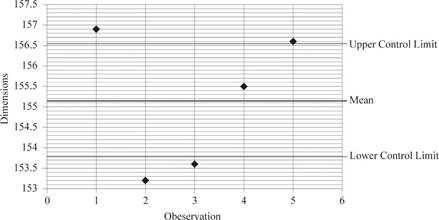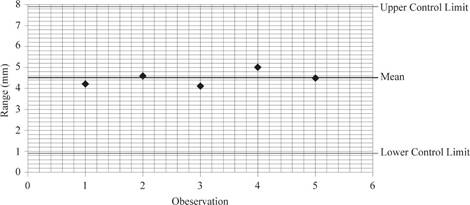
Concept explainers
a)
To determine: The value of
Introduction: Control charts used to determine whether the process is under control or not. Attributes and variables are the factors under the control charts.
a)
Answer to Problem 7P
Hence, the value of
Explanation of Solution
Given information:
The following information is given:
| Day | Mean (MM) | Range (MM) |
| 1 | 156.9 | 4.2 |
| 2 | 153.2 | 4.6 |
| 3 | 153.6 | 4.1 |
| 4 | 155.5 | 5 |
| 5 | 156.6 | 4.5 |
Determine the value of
| Day | Mean (MM) |
| 1 | 156.9 |
| 2 | 153.2 |
| 3 | 153.6 |
| 4 | 155.5 |
| 5 | 156.6 |
| Total | 775.8 |
Calculate the
It is calculated by dividing the sum of mean values and the number of days.
Hence, the value of
b)
To determine: The value of
Introduction: Control charts used to determine whether the process is under control or not. Attributes and variables are the factors under the control charts.
b)
Answer to Problem 7P
Hence, the value of
Explanation of Solution
Given information:
The following information is given:
| Day | Mean (MM) | Range (MM) |
| 1 | 156.9 | 4.2 |
| 2 | 153.2 | 4.6 |
| 3 | 153.6 | 4.1 |
| 4 | 155.5 | 5 |
| 5 | 156.6 | 4.5 |
Determine the value of
| Day | Range (MM) |
| 1 | 4.2 |
| 2 | 4.6 |
| 3 | 4.1 |
| 4 | 5 |
| 5 | 4.5 |
| Total | 22.4 |
Calculate the
It is calculated by dividing the sum of mean values and the number of days.
Hence, the value of
c)
To plot: The UCL and LCL for
Introduction: Control charts used to determine whether the process is under control or not. Attributes and variables are the factors under the control charts.
c)
Answer to Problem 7P
Hence, the value of UCL is 156.54mm and LCL is 153.78mm.
Explanation of Solution
Given information:
The following information is given:
| Day | Mean (MM) | Range (MM) |
| 1 | 156.9 | 4.2 |
| 2 | 153.2 | 4.6 |
| 3 | 153.6 | 4.1 |
| 4 | 155.5 | 5 |
| 5 | 156.6 | 4.5 |
Determine the UCL and LCL of
Formulae to determine Upper Control Limit and Lower Control Limit are given as follows:
Here, the overall mean is
Given the
Substitute the values in the given formulae:
Upper control limit can be calculated by adding the multiple of average range and mean factor with the overall mean.
Lower control limit can be calculated by subtracting the multiple of average range and mean factor from the overall mean.
Hence, upper control limit is 156.54mm and 153.78mm.
Plot the values:

d)
To plot: The UCL and LCL for
Introduction: Control charts used to determine whether the process is under control or not. Attributes and variables are the factors under the control charts.
d)
Answer to Problem 7P
Hence, the value of UCL is 7.96mm and LCL is 0.999mm.
Explanation of Solution
Given information:
The following information is given:
| Day | Mean (MM) | Range (MM) |
| 1 | 156.9 | 4.2 |
| 2 | 153.2 | 4.6 |
| 3 | 153.6 | 4.1 |
| 4 | 155.5 | 5 |
| 5 | 156.6 | 4.5 |
Determine the UCL and LCL of
Formulae to determine Upper Control Limit and Lower Control Limit are given as follows:
Here, the average range is
Given the sample size of 10 for
Substitute the values in the given formulae:
Upper control limit can be calculated by multiplying upper range factor and average range.
Upper control limit can be calculated by multiplying lower range factor and average range.
Hence, upper control limit is 7.96mm and 0.999mm.
Plot the values:

e)
To determine: The UCL and LCL for
Introduction: Control charts used to determine whether the process is under control or not. Attributes and variables are the factors under the control charts.
e)
Answer to Problem 7P
Hence, the value of UCL is 156.38mm and LCL is 153.62mm.
Explanation of Solution
Given information:
The following information is given:
| Day | Mean (MM) | Range (MM) |
| 1 | 156.9 | 4.2 |
| 2 | 153.2 | 4.6 |
| 3 | 153.6 | 4.1 |
| 4 | 155.5 | 5 |
| 5 | 156.6 | 4.5 |
Given the target value of the diameter
Here,
The target value of the diameter
Given the sample size of 10, the Mean factor
Substitute the values in the given formulae:
Upper control limit can be calculated by adding the multiple of average range and mean factor with the overall mean.
Lower control limit can be calculated by subtracting the multiple of average range and mean factor from the overall mean.
Hence, for the
Want to see more full solutions like this?
Chapter 6 Solutions
Principles Of Operations Management
- Gas sales across type: 80% of gas sales tend to be regular. 15% midgrade, 5% tend to be premium. $0.10 increase in price per gallon tends to decrease gallons sold by 1 to 3%. Jan-0.87, Feb-0.95, Mar-1.00, Apr-1.05, May-1.08, Jun1.15, Jul-1.13, Aug-1.07, Sep-1.02, Oct-0.94, Nov-0.89, Dec-0.85. You want the MAPE to be below 20%, if ypu can get it to or below 10% they'll throw in extra $10k. Wont get bonus if it is above 11% or 20%. It cannot be over 20%.arrow_forwardhelp me choose the correct path please. There are other optionsarrow_forwardNegotiators can gain several benefits from using the strategy of multiple equivalent simultaneous offers. By offering multiple options it reduces the chance of rejection. It also improves the chances of reaching reaching an agreement. By presenting multiple offers, it shows you are flexible. agree with the postarrow_forward
- Negotiators can gain several benefits from using the strategy of multiple equivalent simultaneous offers. By offering multiple options it reduces the chance of rejection. It also improves the chances of reaching reaching an agreement. By presenting multiple offers, it shows you are flexible. disagree with this post or add on to the postarrow_forwardThe strategy of Multiple Equivalent Simultaneous Offers involves presenting several equally valuable options to the other party during negotiations. This approach benefits negotiators by creating flexibility and increasing the chances of finding a mutually agreeable solution. By offering multiple options, negotiators show that they are open to compromise, which can build trust and make the negotiation process smoother. It also helps avoid getting stuck on one issue, as the other party can choose from several alternatives that meet their needs. In my experience, using MESOs in a work negotiation helped both parties reach an agreement more quickly because each option was carefully thought out to address different needs, and this made it easier for us to settle on one that worked for both sides. This strategy can also reveal what is most important to the other party, helping negotiators understand their priorities better. agree or disagree with the postarrow_forwardExamine the conflicts between improving customer service levels and controlling costs in sales. Strategies to Balance Both customer service levels and controlling costs in sales 1.Outsourcing and workforce optimization 2. AI-driven customer supportarrow_forward
- how can you gain trust in a negotiation setting?arrow_forward✓ Custom $€ .0 .on File Home Insert Share Page Layout Formulas Data Review View Help Draw Arial 10 B B14 ✓ X✓ fx 1400 > 甘く 曲 > 冠 > Comments Editing ✓ . . . P Q R S T 3 A Production cost ($/unit) B с D E F G H J K L M N $74.00 4 Inventory holding cost ($/unit) $1.50 5 Lost sales cost ($/unit) $82.00 6 Overtime cost ($/unit) $6.80 7 Undertime cost ($/unit) $3.20 8 Rate change cost ($/unit) $5.00 9 Normal production rate (units) 2,000 10 Ending inventory (previous Dec.) 800 11 Cumulative 12 13 Month Demand Cumulative Demand Product Production Availability Ending Inventory Lost Cumulative Cumulative Product Sales 14 January 1,400 1,475 15 FUERANZ222222223323333BRUINE 14 February 1,000 2,275 Month January February Demand Demand Production Availability Ending Inventory Lost Sales 1,400 #N/A 1,475 #N/A #N/A #N/A 1,000 #N/A 2,275 #N/A #N/A #N/A 16 March 1,800 2,275 March 1,800 #N/A 2,275 #N/A #N/A #N/A 17 April 2,700 2,275 April 2,700 #N/A 2,275 #N/A #N/A #N/A 18 May 3,000 2,275 May 3,000 #N/A…arrow_forwardFollow guidelines and summarize in a paragrapharrow_forward
 Practical Management ScienceOperations ManagementISBN:9781337406659Author:WINSTON, Wayne L.Publisher:Cengage,
Practical Management ScienceOperations ManagementISBN:9781337406659Author:WINSTON, Wayne L.Publisher:Cengage, Foundations of Business (MindTap Course List)MarketingISBN:9781337386920Author:William M. Pride, Robert J. Hughes, Jack R. KapoorPublisher:Cengage Learning
Foundations of Business (MindTap Course List)MarketingISBN:9781337386920Author:William M. Pride, Robert J. Hughes, Jack R. KapoorPublisher:Cengage Learning Foundations of Business - Standalone book (MindTa...MarketingISBN:9781285193946Author:William M. Pride, Robert J. Hughes, Jack R. KapoorPublisher:Cengage Learning
Foundations of Business - Standalone book (MindTa...MarketingISBN:9781285193946Author:William M. Pride, Robert J. Hughes, Jack R. KapoorPublisher:Cengage Learning



